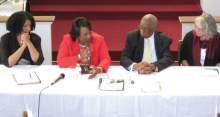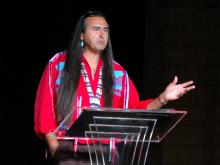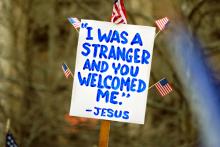Moving Mountains

BERNICE KING watched as, one by one, the heads of denominations from across the nation bent down to sign the Christian Churches Together in the U.S.A. “Response to Dr. Martin Luther King Jr.’s ‘Letter from Birmingham Jail.’” Transfixed, King—Martin King’s daughter—sat in the first row of a church one block from Kelly Ingram Park, where 50 years before children had run scared, ravaged by German shepherds and fire hoses.
As they signed, the presidents of CCT’s five church “families” stepped to the podium. Each read his or her church family’s confession of complicity with the demons of racism and injustice during and since the civil rights era.
Fifty years ago, Martin Luther King Jr. sat behind bars in the Birmingham city jail and responded to criticism from eight local white clergy’s “Call for Unity” against outside agitators. King penned prophetic words in the margins of the newspaper that carried the white clergy’s call for “law and order and common sense.”
“Injustice anywhere is a threat to justice everywhere,” King explained. He recounted the failed attempts to negotiate with city officials hell-bent on living a “monologue rather than dialogue.” He clarified: “The purpose of our direct-action program is to create a situation so crisis-packed that it will inevitably open the door to negotiation.”

ALL EYES WERE fixed on Richard Twiss, the Lakota/Sioux co-founder and president of Wiconi International, who stood center stage at the 2011 Christian Community Development Association conference.
Twiss pulled no punches as he told the truth about the church's role in colonization: The global genocide of indigenous peoples and the eradication of indigenous cultures by requiring people to cut their hair, leave their families, forsake their languages, and forswear their drums. Coaxed to convert or be damned, indigenous people exchanged their own culture for guitars and mission schools in order to be "Christian."
On Feb. 9, 2013, Richard Twiss passed to the other side of life. For many he was a key voice for indigenous people finding a way to reclaim their culture while keeping hold of Christ. While Twiss was a primary voice of the movement, he was also a member of a larger circle of indigenous leaders, each of whom has played his or her part to establish and spread the good news of cultural reconciliation after "500 years of bad haircuts," as Twiss liked to put it.
Twiss had enormous impact on the indigenous "contextual ministry" movement. "Contextualization means to present the good news of the shalom kingdom of Jesus Christ in a way that people can understand and relate to in their own cultural context," explained Randy Woodley (Keetoowah Cherokee), distinguished associate professor of faith and culture at George Fox Evangelical Seminary.

DURING THE SUMMER of 2003, 25 staff of InterVarsity Christian Fellowship and their families rode a bus through 10 states on the "Pilgrimage for Reconciliation." We retraced the Cherokee Trail of Tears and explored the journey of African Americans from slavery to the civil rights movement.
As we rolled over land that had witnessed the most evil individual acts and public policies enacted on American soil, and as we heard again and again how the church was either silent or complicit, we wondered aloud: "What issue will cause our grandchildren to look back at us and ask, 'Where were you?'"
There are many we could choose from. But on this day, approaching spring 2013—a decade after our pilgrimage, 50 years after Dr. King's "Letter from Birmingham Jail," 150 years after the Emancipation Proclamation—I know where I stand. On this day, I stand with my sisters and brothers in the church who are pressing our nation's leaders toward just and comprehensive immigration reform.
In the last three years, more than 1 million men, women, and children have been erased from our land through deportation. They were caught between two signs at our border: "Help Wanted" and "No Trespassing."
By law, only 5,000 "unskilled" workers are allowed into the U.S. through legal means each year. That is about the number of people processed on Ellis Island every day in the early 1900s. Meanwhile, our nation's industry and food supply rely heavily on the labor of immigrant populations. About 75 percent of all U.S. farmworkers are unauthorized immigrants. Then consider other industries: meatpacking, hospitality, restaurants, transportation. The disparity between the demand for workers and the supply is untenable.

In the dark days of Advent, we wonder when the birth pangs will end: Will light break into the darkest corners of our hearts, our families, our lives? Will God—can God—take the twisted sinew of our warped world and redeem it? Will we—can we—hold on through the night? Can we trust that light to come? These are the questions of Advent.
As we enter the season of Epiphany, new questions arise: Will we allow the light that has broken forth to illuminate the darkest corners of hearts, our families, and our lives? Can we—will we—follow Jesus as he untwists the mangled metal of our shattered souls ... and redeems it? Can we—will we—trust the light or will we hide from it? These are the questions of Epiphany.
The light of Epiphany illuminates in two directions: It flashes inward, revealing our twisted and fragmented souls, and it flashes outward, revealing the carnage and consequences of the lies our world has embraced and used to craft public policy, the lies we have believed and reinforced through our complicit acceptance, and the truth we must speak.
As we enter 2013, we look back and see that over the past four years much public good was done. Remember: The Lilly Ledbetter Fair Pay Act made it easier for women to fight pay discrimination. Remember the drama when Congress passed the Affordable Care Act and the Supreme Court upheld it, creating a path for tens of millions of Americans to finally receive health care. Remember the image of the last troops leaving Iraq.